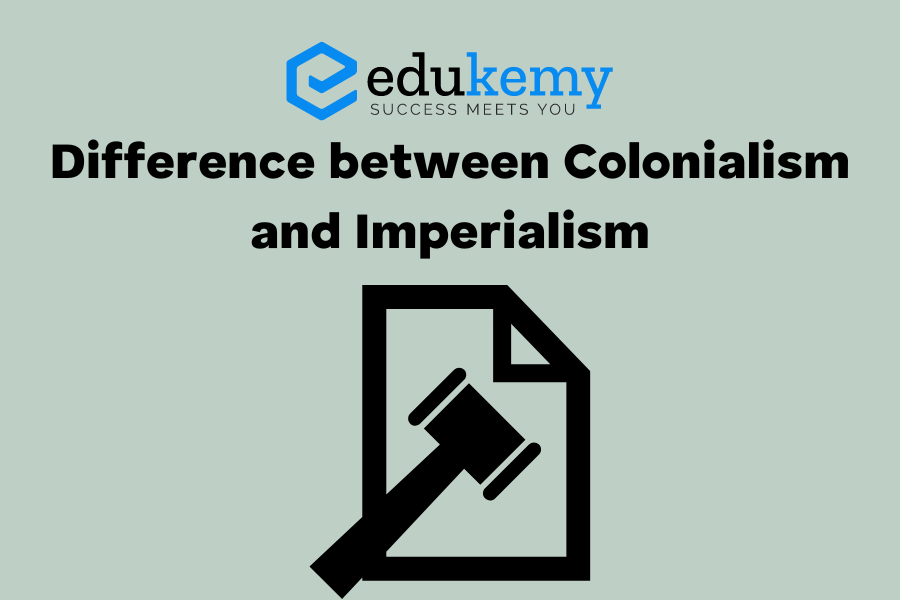
Colonialism and imperialism are often used interchangeably, yet they represent distinct forms of dominance and control exercised by one group over another. Colonialism typically refers to the direct settlement of a foreign territory by a dominant power, involving the imposition of its governance, culture, and institutions onto the colonized land and people. In contrast, imperialism is a broader concept encompassing various methods of extending influence and control, including but not limited to direct colonization. Imperialism can manifest through economic, political, or military means, often seeking to exploit resources, markets, or strategic advantages without necessarily establishing permanent settlements. Understanding the nuances between colonialism and imperialism is essential for comprehending historical power dynamics and their enduring impacts on global societies.
Contents
Imperialism vs Colonialism
Definition:
- Imperialism: It is the policy, practice, or advocacy of extending a nation’s dominion and power, often by gaining indirect control over the political or economic life of other areas or by direct territorial acquisitions. It broadly refers to the extension or imposition of power, authority, or influence.
- Colonialism: This is the policy and practice of a powerful entity expanding its influence over weaker or dependent regions or peoples. It typically involves collecting raw materials, exploiting natural resources, populating the area with settlers, and/or extending political power.
Origin:
- Imperialism is significantly older, dating back to ancient empires like the Roman Empire.
- Colonialism in the modern sense originated in the 15th century, when Europeans began conquering vast areas of Asia and Africa.
Aim:
- Imperialism: Aims to build an empire, extend into adjacent regions, and establish domination worldwide.
- Colonialism: Aims to utilize the riches of conquered countries for the profit of the conqueror.
Features:
- Imperialism involves creating an empire and expanding borders to exert influence. It does not necessarily involve mass migration.
- Colonialism involves mass migration to establish colonies, which progressively alter the social, physical, and economic structure of the region.
Eco-political Aspects:
- Under imperialism, indigenous people may be allowed to maintain their traditional way of life.
- In colonialism, native peoples often must abandon their traditional way of life, as it is frequently disrupted or destroyed.
Focus:
- Imperialism: Focuses on economic and political dominance over regions.
- Colonialism: Focuses on gaining economic access through exploitation.
Settlement:
- In imperialism, the rulers typically do not reside in the land they control.
- In colonialism, settlers come together and establish colonies in the conquered territory.
Examples:
- An example of imperialism is the policy implemented by Genghis Khan’s kingdom to conquer vast sections of Asia.
- An example of colonialism is the British establishing colonies in the United States, displacing native inhabitants.
FAQs
1. What is Colonialism?
- Colonialism refers to the practice of establishing control over a territory, often by a foreign power, with the intent of exploiting its resources, labor, and markets. It involves the settlement of people from the colonizing country into the colonized territory, leading to significant cultural, economic, and political domination.
2. What is Imperialism?
- Imperialism is a broader concept that encompasses various forms of domination and control exercised by one country or group over others. It can involve direct political control, economic dominance, cultural influence, or military intervention. Imperialism can take different forms, including colonialism, but it also extends to indirect rule, economic imperialism, and spheres of influence.
3. How do they differ in scope?
- Colonialism typically involves the establishment of colonies in distant territories, with settlers from the colonizing country often permanently relocating to the colonized land. Imperialism, on the other hand, may not always entail the physical occupation of territories; it can manifest through economic exploitation, political manipulation, or cultural hegemony without necessarily establishing colonies.
4. What are the goals of Colonialism and Imperialism?
- Colonialism’s primary objective is the direct control and exploitation of resources, labor, and markets in the colonized territory for the benefit of the colonizing power. Imperialism, while also driven by economic interests, may have broader geopolitical aims, such as extending political influence, securing strategic territories, or maintaining dominance over regions.
5. How do they impact indigenous populations differently?
- Colonialism often leads to significant displacement, exploitation, and marginalization of indigenous peoples as settlers impose their culture, laws, and economic systems on the native population. Imperialism, depending on its form, can have varied effects on indigenous communities, ranging from cultural assimilation and displacement to economic dependency and political subjugation, without necessarily involving direct settlement.
In case you still have your doubts, contact us on 9811333901.
For UPSC Prelims Resources, Click here
For Daily Updates and Study Material:
Join our Telegram Channel – Edukemy for IAS
- 1. Learn through Videos – here
- 2. Be Exam Ready by Practicing Daily MCQs – here
- 3. Daily Newsletter – Get all your Current Affairs Covered – here
- 4. Mains Answer Writing Practice – here

